
6 minute read
BEST PLAYING PONIES
BEST PLAYING PONIES
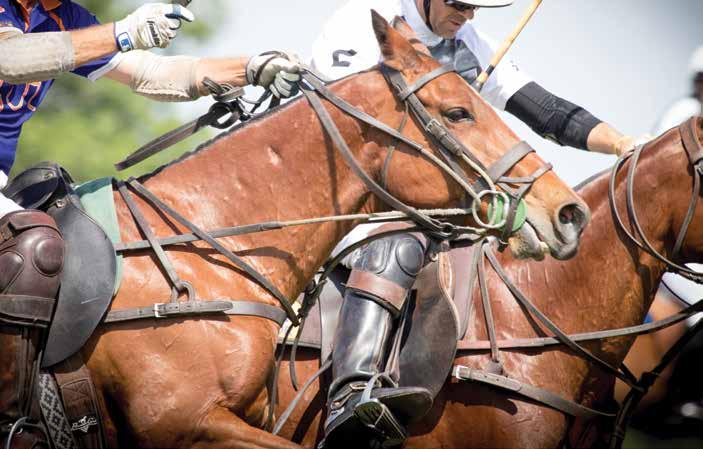
As you watch an adrenaline-fueled polo game, it is impossible not to admire the skilled equine athletes that carry players from one end of the field to the other, pivoting on a dime, running to goal, fearlessly riding other ponies off the ball, and responding to the split-second changes in the game.
Most players agree that the polo pony you ride in the game makes up 70–80% of your skill on the field. And because the ponies work hard in their 7-1/2-minute chukkers (galloping up to 3 miles in a single chukker), players must bring several ponies to the field for a game, known as a string of ponies. Many high-goal players have strings of 10 ponies, while lower-goal players will have a string of 4–6.

It can take years to build your dream string, just ask anyone who has tried! Here we get advice from respected Houston Polo Club polo pros, Marcos Villanueva and Nick Cifuni, on what makes a great pony and how to start building your polo string.

A WINNING PONY
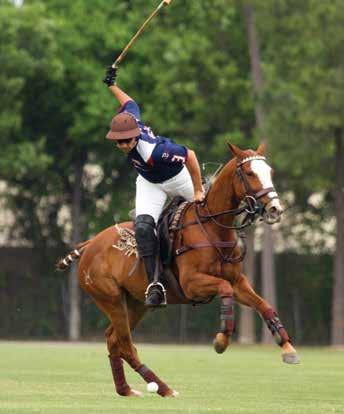
Marcos Villenueva
PHYSICAL ATTRIBUTES
Marcos breeds and raises young horses, training them over 6–7 years to become skilled polo ponies. He believes that, when looking for a champion, you cannot beat a mare with a polo bloodline: “I believe in the genetics. If a mother was a good polo mare and she played really well, I would rather breed that mare.” To that end, Marcos breeds his champion mares by implanting embryos in recipient surrogate mares, allowing him to produce up to three foals per year from his best bloodlines.
Marcos describes what he looks for in the physical attributes of a polo pony: 15.1 or 15.2 hands, broad chested, and a short back to make stopping and pivoting faster. “Some people think that if a player is big, they need a tall horse. But that is a mistake. You can match that big guy with a 15.2 hand horse, but just buy them wider and stronger to carry the weight. It is easier to hit the ball when you are closer to the ground than when you are on a tall horse.”
TRAINING

Nick Cifuni
Nick calls upon his multidisciplinary experience to develop his unique style and philosophy of training polo ponies: “The disciplines are all connected. If a horse is disciplined and moving the way they need to move, then they can do it in polo, they can do it in hunter/jumper, three-day eventing, reining, and cutting—it’s all the same movements. I am always watching different people and horses to build my style of getting what I need out of a horse. A good broke horse and good trainer should be able to connect all the disciplines together.”
Training a polo pony is a gradual process. Marcos starts the breaking process at about 3 years, and then it is 3–4 years before they are ready to play competitively: “When they do everything that I ask of them (riding, stick and ball), and they are relaxed about it, then I know they are ready to play polo. First I play them for 2–3 months in slow chukkers, then the next season will be a little faster, and then a little faster, and on and on.”
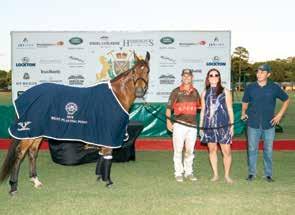
TEMPERAMENT
Nick’s criteria for temperament is simple: when you ride them, they are willing to work with you. “I don’t mind a little fight in them, but when you ask them to do something, they should be willing to do it.”
Marcos adds: “You want a horse that you can run and score a goal at full speed, and then come back and be relaxed. Not a crazy one that moves all around. They can take pressure when you ask them; and when you don’t, they can relax.”
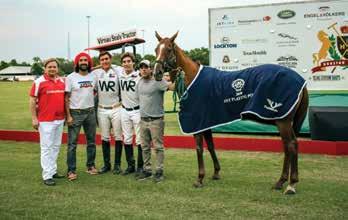
INTELLIGENCE
“The mind is everything,” states Marcos. “In my experience, I’ve seen many horses with unbelievable qualities off the field, but when it comes time to play they don’t adapt to the pressure in a way that displays their ability. I feel they are pressured too soon. This can result in ruining the pony’s career. Developing the horse’s natural qualities takes time and patience. Knowing the time to push them is key.”
Nick also stresses the pony’s ability to learn, and keep learning: “When I ride a horse once, and then go to get on the next day, I see if they retained the information I taught them the day before. Are they willing to learn? Are they able to learn so I can move forward with them?”
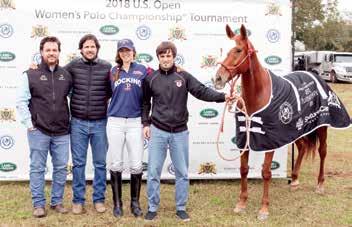
BUILDING YOUR STRING
• Match the skill level of the horse with your current skill level: “Don’t buy anything that you think you are going to grow into. Buy the horse you need for the polo you are playing now,” advises Nick. “If you pair a horse that is really soft in the mouth and really athletic and quick with someone that doesn’t have the athletic ability to ride something like that, it’s going to be a bad fit.”
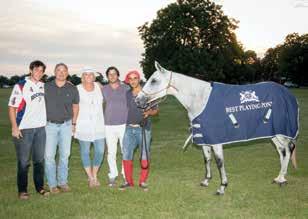
• Be patient. “Many players just go and buy horses from anybody, and unfortunately they buy expensive horses that are not for them,” says Marcos. Take your time, advises Nick: “Ride a few horses, ask questions, talk to different people. A horse that may work for me doesn’t necessarily work for somebody else, so sit on a bunch of different ones before you buy.”
• You can always sell a horse and buy another one. Don’t keep riding a horse that is not suited to you. “If you have a horse you are not able to ride, all you are going to do is have a bad connection,” says Nick. “You might ruin a good horse, or you might ruin your experience in polo because you are not having fun.”
• Find someone that you trust to help you. People who love polo and who love horses also love helping others find the right fit. “I like to match horses with people,” says Nick. “So if I am riding a horse, and I think the horse will be a good fit for someone, I will put them in touch with each other. There is nothing more fulfilling than seeing a good match.” Pro players know polo ponies and are excellent brokers when you are looking. “Go and find somebody that you trust who knows horses,” advises Marcos. “If I am responsible for buying horses, I want to make sure those horses are really good. It is my reputation on the line.”

Marcos Villanueva grew up in Argentina, the son of an equine vet and an 8-goal polo player. He has been working as a pro since he was 18, traveling and playing polo in England, Thailand, France, and Jordan, and ultimately settling in Houston. Marcos is currently and 4-goal pro with Rocking P, the Polo Manager for the Price family, and breeds and trains polo ponies.
Nick Cifuni learned to ride as a youngster in Argentina, where he competed in hunter/jumper and three-day eventing, and grew up watching and developing a passion for high-goal polo. When he returned to the United States, Nick boarded his jumping horse at a polo club in Colorado and, at age 14, started trading his time tacking horses and tending the fields in exchange for polo lessons. He played Intercollegiate Polo at Colorado State, and at the age of 22, Nick wintered in Florida and spent time in Tennessee and Texas, where he trained horses and established himself as a pro. Based out of Tennessee, Nick is a 3-goal player who divides his time between Florida and Texas.





